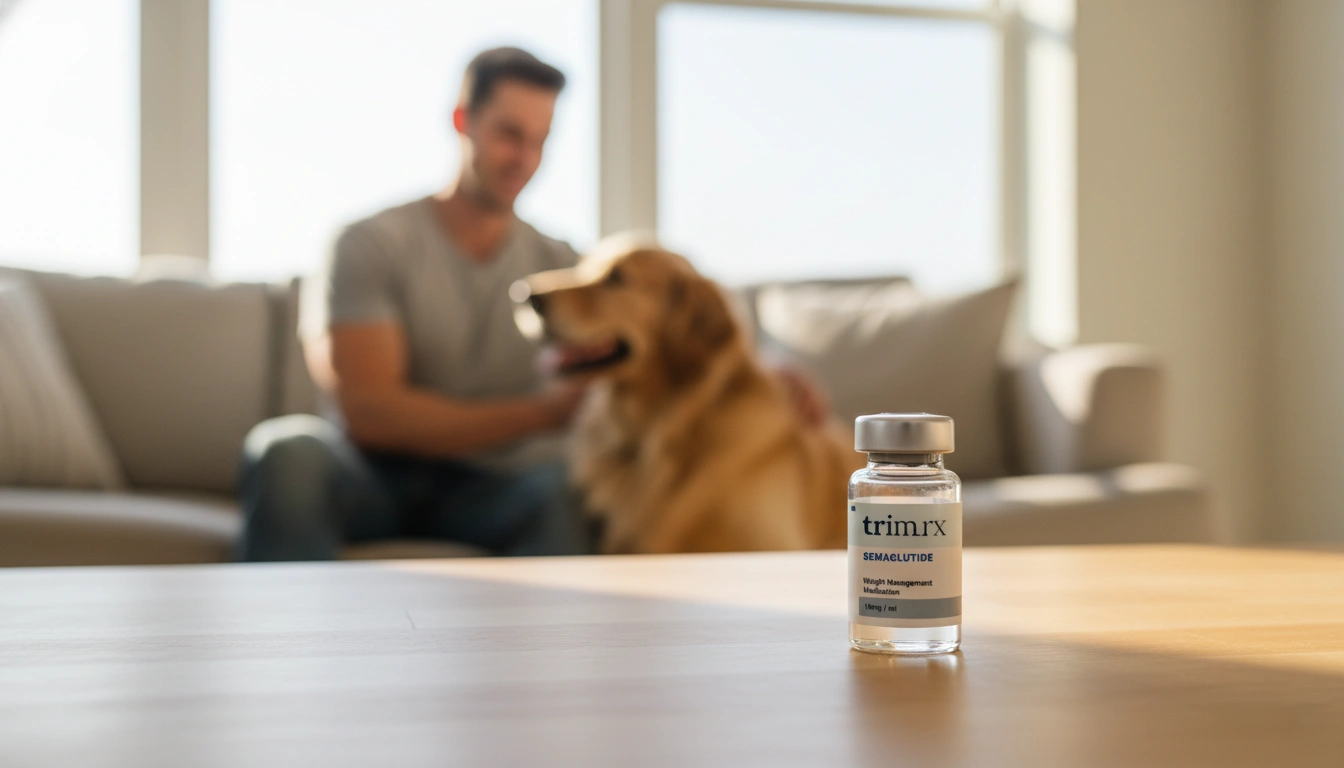How to Combat Semaglutide Fatigue: Strategies to Boost Your Energy and Thrive

Introduction
Feeling unexpectedly drained of energy after starting semaglutide isn’t uncommon, yet it can be frustrating when you’re motivated to improve your health and achieve sustainable weight loss. Semaglutide, a widely recognized medication offering promising support for weight management and blood sugar control, can—paradoxically—bring episodes of fatigue as the body adapts to its effects. What causes this sluggishness? Is it inevitable? And most importantly, how can you fight back and regain your vitality during treatment?
The answers to these questions are crucial for anyone embarking on a health journey that includes semaglutide, be it prescription brand-name options like Ozempic®, Wegovy®, or compounded semaglutide formulations. In this post, we explore the underlying reasons for semaglutide fatigue, practical and science-backed strategies to overcome it, and how integrating personalized care, such as the programs offered by TrimRx, can support you through the transition.
Together, we’ll navigate the complexities of semaglutide’s effects on your body and empower you to optimize your energy levels safely and sustainably.
By the end of this blog, you will understand the common causes of semaglutide-related fatigue, discover actionable tips to manage it effectively, and learn how to take full advantage of a personalized, medically supervised weight loss plan. Let’s begin by exploring the foundational science behind how semaglutide interacts with your body and why that might contribute to tiredness.
Understanding Semaglutide and Its Impact on Energy
Semaglutide belongs to a class of drugs called GLP-1 receptor agonists. These compounds mimic a naturally occurring hormone called glucagon-like peptide-1, which helps regulate appetite, insulin secretion, and blood sugar levels. Originally developed to manage type 2 diabetes, semaglutide has gained notable attention for its significant ability to support weight loss by reducing hunger and promoting a sense of fullness.
Why Fatigue Happens: The Science Behind Semaglutide Fatigue
Fatigue during semaglutide treatment is often multi-factorial. Here are key physiological factors that contribute to this feeling of low energy:
-
Reduced Caloric Intake: Semaglutide’s appetite-suppressing effect means many individuals naturally consume fewer calories. While this deficit is necessary for weight loss, it also means your body has less fuel to draw on, especially during the early phase before metabolic adjustments occur.
-
Blood Sugar Stabilization: Semaglutide helps stabilize blood sugar by modulating insulin and glucagon hormones. These shifts, while beneficial for controlling diabetes and preventing sugar spikes, can sometimes lead to lower daytime glucose availability. This can cause temporary dips in energy, particularly if meals are spaced too far apart or lack adequate nutrients.
-
Nausea and Dehydration: Some users experience nausea, which may reduce fluid intake and cause mild dehydration—both known contributors to feelings of fatigue and sluggishness.
-
Hormonal Shifts and Sleep Disturbances: The interplay of semaglutide with hormones regulating stress and energy balance can sometimes affect sleep quality, compounding daytime tiredness.
Importantly, these fatigue symptoms are usually transient as your body adapts to the medication. But understanding these mechanisms equips you to manage your energy proactively instead of feeling powerless against exhaustion.
Personalized Support: Why Customized Care Makes a Difference
At TrimRx, our mission centers around the principle that sustainable weight loss comes from an individualized approach that blends science, empathy, and transparency. We recognize that every person’s response to semaglutide is unique—what’s effective and manageable for one may not be the same for another. That is why we offer personalized weight loss programs—including medications such as compounded semaglutide, oral semaglutide, Ozempic®, compounded tirzepatide, Mounjaro®, and others—designed to fit your specific health profile.
By taking our free assessment quiz here, you can discover if you qualify for these tailored solutions, which come with comprehensive doctor consultations, lab work, unlimited support, and shipping through FDA-registered, inspected pharmacies. This ensures you have both medical oversight and individualized guidance to optimize your journey, including managing side effects like fatigue.
Practical Strategies to Combat Semaglutide Fatigue
Feeling tired doesn’t mean your journey has to slow down. With intentional strategies, you can enhance your energy levels and maintain motivation during your treatment. Let’s explore some effective approaches:
1. Prioritize Balanced, Nutrient-Dense Meals
Since semaglutide naturally reduces appetite, it’s essential to focus on the quality of your intake rather than just the quantity. Consuming nutrient-rich foods ensures your body receives the energy and vitamins it needs to function optimally.
- Incorporate lean proteins (chicken, fish, legumes) to support muscle maintenance and satiety.
- Include healthy fats (avocado, nuts, olive oil) to provide sustained energy.
- Choose complex carbohydrates (whole grains, vegetables) to stabilize blood sugar and supply glucose gradually.
- Add iron-rich foods and B vitamins (spinach, fortified cereals, eggs) to combat fatigue and support red blood cell health.
- Consider consuming small, frequent meals to avoid energy crashes and maintain steady glucose levels.
If you’re interested in boosting your nutritional support, TrimRx offers quick-access supplements like GLP-1 Daily Support and Weight Loss Boost, designed to enhance your wellness alongside your prescribed medication.
2. Stay Hydrated
Dehydration can stealthily worsen fatigue, and nausea induced by semaglutide may hinder your fluid intake. Aim to drink water consistently throughout the day.
- Try adding lemon or herbal teas to make hydration more enjoyable.
- Sip fluids slowly if nausea is present to avoid triggering symptoms.
- Electrolyte-enhanced drinks can be beneficial if you have vomiting or significant fluid losses.
Proper hydration helps your body’s systems function efficiently, promoting alertness and reducing sluggishness.
3. Build a Sleep-Friendly Routine
Quality sleep is foundational for energy restoration.
- Set consistent sleep and wake times to regulate your body’s internal clock.
- Minimize screen exposure at least an hour before bedtime to improve sleep onset.
- Engage in relaxation techniques such as deep breathing or meditation to reduce pre-sleep anxiety.
- Create a serene environment conducive to restful sleep—comfortable bedding, cool temperature, and minimal light.
If sleep disturbances persist, discuss them with your healthcare provider, as addressing underlying causes can significantly reduce fatigue.
4. Incorporate Light Physical Activity
Although counterintuitive when you’re tired, light exercise can actually enhance your energy.
- Gentle walking increases blood flow, oxygen delivery to muscles, and releases mood-boosting endorphins.
- Yoga or stretching can reduce muscle tension and stress, improving overall well-being.
- Begin with short sessions and listen carefully to your body to avoid overexertion.
As you build stamina, activity can become a powerful ally against fatigue.
5. Manage Stress Proactively
Chronic stress depletes energy reserves and can amplify feelings of tiredness.
- Mindfulness practices help anchor your mind and calm racing thoughts.
- Spending time outdoors or connecting with supportive communities can improve mental resilience.
- Consider techniques like journaling or breathing exercises to process stress effectively.
TrimRx’s platform offers a supportive environment where you can receive compassionate care and encouragement throughout your weight loss journey, helping you navigate emotional challenges alongside physical ones.
6. Monitor Blood Sugar Levels and Nutrition Closely
Since semaglutide affects blood sugar regulation, fluctuations can impact your energy.
- Avoid long gaps between meals to prevent dips in blood sugar.
- Include a balance of macronutrients to stabilize glucose levels.
- Regularly monitor your blood sugar, especially if you have diabetes, and communicate with your healthcare provider about any concerns.
Adjusting your regimen in collaboration with medical guidance ensures your energy remains balanced.
7. Consult Your Healthcare Provider if Fatigue Persists
Persistent or severe fatigue may signal other factors such as nutrient deficiencies, sleep disorders, or medication adjustments that need professional evaluation.
At TrimRx, our team emphasizes transparent care and collaborates with you and FDA-registered pharmacies to ensure safety and efficacy. If fatigue disrupts your daily life, seeking expert advice can help tailor your treatment plan for better outcomes.
Embracing a Sustainable Weight Loss Journey with TrimRx
Semaglutide can be a powerful tool in managing weight and improving metabolic health, but fatigue is a challenge many face early on. At TrimRx, we are committed to walking beside you at every step of your personalized journey, combining cutting-edge telehealth innovations with clinically proven, individualized care.
Our approach is grounded in science and compassion, ensuring you receive comprehensive support—including doctor consultations, medication management, lab work, and unlimited guidance—to not only help you shed pounds but to feel energized and empowered.
If you haven’t already, start by taking our free assessment quiz here to discover your personalized treatment options. Additionally, explore our quick-access supplements GLP-1 Daily Support and Weight Loss Boost to complement your regimen and support your wellness.
Summary and Reflection
Semaglutide fatigue is a recognized but often temporary side effect that stems from appetite suppression, metabolic adjustments, blood sugar modulation, and hydration or hormonal changes. By adopting strategic lifestyle measures—nutrient-rich meals, hydration, quality sleep, light exercise, and stress management—you can mitigate tiredness and maintain momentum toward your health goals.
A personalized treatment plan, such as those provided by TrimRx, offers an added layer of safety, monitoring, and individualized care that empowers you to harness semaglutide’s benefits without compromising your energy or well-being.
Have you noticed fatigue since starting semaglutide? How have you managed it so far? We invite you to reflect on these strategies and consider which might fit best into your own routine. Remember, every step you take toward understanding and managing your body’s response brings you closer to sustainable, vibrant health.
FAQ
Q1. Is fatigue after starting semaglutide normal?
Yes. Many individuals experience fatigue as their body adjusts to changes in appetite, blood sugar, and hormones. This typically improves over time but should be managed proactively.
Q2. How long does semaglutide fatigue usually last?
Fatigue often occurs during the initial weeks of treatment and tends to lessen as your body adapts over 4 to 8 weeks. If fatigue persists beyond this or worsens, consult your healthcare provider.
Q3. Can changing my diet help reduce semaglutide-related tiredness?
Absolutely. Eating nutrient-dense, balanced meals with adequate protein, healthy fats, and complex carbs supports stable energy levels and combats fatigue.
Q4. Are there supplements that can help fight semaglutide fatigue?
Supplements like TrimRx’s GLP-1 Daily Support and Weight Loss Boost are designed to support overall wellness during your weight loss journey alongside prescription medications.
Q5. Should I stop taking semaglutide if I feel very fatigued?
No. Fatigue is a common side effect, but you should discuss symptoms with your healthcare provider before stopping. They can help adjust your plan or address underlying causes.
Q6. How can exercise help with fatigue caused by semaglutide?
Light exercise like walking or stretching increases blood circulation and endorphin release, naturally boosting energy levels. Start gently and increase as tolerated.
Q7. Does dehydration contribute to semaglutide fatigue?
Yes. Nausea-related fluid loss or insufficient hydration can worsen tiredness. Drinking plenty of fluids is essential for combating fatigue.
Q8. Can poor sleep with semaglutide be treated?
Yes. Improving sleep hygiene and relaxation techniques can help. Persistent sleep issues should be discussed with a healthcare provider.
Q9. How does TrimRx support patients experiencing fatigue on semaglutide?
We offer personalized programs featuring doctor consultations, lab work, continuous support, and access to prescription medications and supplements through FDA-registered pharmacies, ensuring your treatment and side effects like fatigue are carefully managed.
Q10. How do I find out if I qualify for semaglutide treatment?
You can start by taking TrimRx’s free assessment quiz here for a personalized evaluation of your eligibility.
Taking charge of semaglutide fatigue is possible—and with the right strategies and support, you can continue progressing with confidence toward your health goals. Let TrimRx be your partner in this transformative journey.

Transforming Lives, One Step at a Time
Keep reading
Semaglutide for Men: Dosing, Results and Special Considerations
Weight loss medications have traditionally been marketed toward women, but the reality is that men face obesity at nearly equal rates and often struggle…
Compounded Semaglutide Cost: Complete Pricing Guide 2026
You’ve learned that brand-name Ozempic costs nearly $1,000 per month, and you’ve heard that compounded semaglutide offers the same active ingredient at a fraction…
Understanding Low-Dose Semaglutide: A Gentle Start to Your Weight Loss Journey
Curious about what is a low dose of semaglutide for weight loss? Discover its importance for a safe start & how it minimizes side effects. Learn more!



